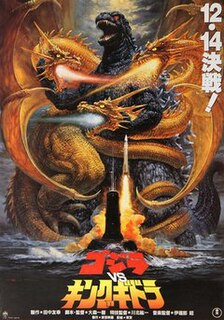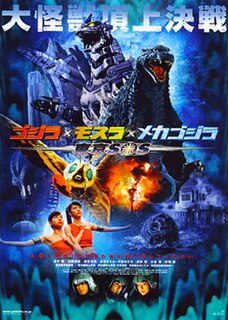
Ebirah, Horror of the Deep is a 1966 Japanese kaiju film directed by Jun Fukuda and produced and distributed by Toho Co., Ltd. The film stars Akira Takarada, Kumi Mizuno, Akihiko Hirata and Eisei Amamoto, and features the fictional monster characters Godzilla, Mothra, and Ebirah. It is the seventh film in the Godzilla franchise, and features special effects by Sadamasa Arikawa, under the supervision of Eiji Tsuburaya. In the film, Godzilla and Ebirah are portrayed by Haruo Nakajima and Hiroshi Sekita, respectively.

Godzilla vs. King Ghidorah is a 1991 Japanese kaiju film written and directed by Kazuki Ōmori and produced by Shōgo Tomiyama. The film, produced and distributed by Toho Studios, is the 18th film in the Godzilla franchise, and is the third film in the franchise's Heisei period. The film features the fictional monster characters Godzilla and King Ghidorah, and stars Kōsuke Toyohara, Anna Nakagawa, Megumi Odaka, Katsuhiko Sasaki, Akiji Kobayashi, Yoshio Tsuchiya, and Robert Scott Field. In the film, time-travelers' from the future warn Japan to prevent Godzilla's mutation, only to reveal their true motives via unleashed a three-headed dragon that terrorizes the city.

Godzilla vs. Mothra is a 1992 Japanese kaiju film directed by Takao Okawara, written by Kazuki Ōmori, and produced by Shogo Tomiyama. Produced and distributed by Toho Studios, it is the 19th film in the Godzilla franchise, and is the fourth film in the franchise's Heisei era. The film features the fictional monster characters Godzilla, Mothra, and Battra, and stars Tetsuya Bessho, Satomi Kobayashi, Takehiro Murata, Megumi Odaka, Shiori Yonezawa, Makoto Otake, Akiji Kobayashi, Koichi Ueda, Shinya Owada, Keiko Imamura, Sayaka Osawa, Saburo Shinoda and Akira Takarada, with Kenpachiro Satsuma as Godzilla. The plot follows Battra and Mothra's attempts to stop Godzilla from attacking Yokohama.

Kaiju is a Japanese genre of films and television featuring giant monsters. The term kaiju can also refer to the giant monsters themselves, which are usually depicted attacking major cities and battling either the military or other monsters. The kaiju genre is a subgenre of tokusatsu entertainment.

Mothra is a fictional monster, or kaiju, that first appeared in the 1961 film Mothra, produced and distributed by Toho Studios. Mothra has appeared in several Toho tokusatsu films, most often as a recurring character in the Godzilla franchise. She is typically portrayed as a colossal sentient larva (caterpillar) or imago, accompanied by two miniature fairies speaking on her behalf. Unlike other Toho monsters, Mothra is a largely heroic character, having been variously portrayed as a protector of her own island culture, the Earth and Japan. Mothra's design is influenced by silk worms, their imagos, and those of giant silk moths in the family Saturniidae. The character is often depicted hatching offspring when approaching death, a nod to the Saṃsāra doctrine of numerous Indian religions.

King Ghidorah is a fictional monster, or kaiju, which first appeared in Ishirō Honda's 1964 film Ghidorah, the Three-Headed Monster. Although the name of the character is officially trademarked by Toho as "King Ghidorah", the character was originally referred to as Ghidorah or Ghidrah in some English markets.

Mothra vs. Godzilla is a 1964 Japanese kaiju film directed by Ishirō Honda, with special effects by Eiji Tsuburaya. Produced and distributed by Toho Co., Ltd, it is the fourth film in the Godzilla franchise. The film stars Akira Takarada, Yuriko Hoshi, Hiroshi Koizumi, Kenji Sahara, and Emi and Yumi Itō, with Haruo Nakajima as Godzilla. In the film, humans beseech the aide of the insect-god Mothra to stop Godzilla from destroying Japan.

Godzilla vs. Mechagodzilla II, is a 1993 Japanese kaiju film directed by Takao Okawara, written by Wataru Mimura, and produced by Shōgo Tomiyama. Produced and distributed by Toho Studios, it is the 20th film in the Godzilla franchise, as well as the fifth film to be released during the franchise's Heisei era. The film features the fictional monster character Godzilla, along with Baby Godzilla and the mecha character Mechagodzilla. Despite its Japanese and English titles, the film is not a sequel to the 1974 film Godzilla vs. Mechagodzilla.

Gigan is a kaiju from Toho's Godzilla franchise who first appeared in Godzilla vs. Gigan. Gigan is a space monster resembling a species of reptile who was turned into a cyborg by the Nebulans. Gigan sports a huge buzzsaw in its frontal abdominal region and large metallic hooks for hands. Gigan is considered one of Godzilla's most brutal and violent opponents, and the first kaiju in the Toho sci-fi series to make him bleed. Complex listed the character as No. 2 on its "The 15 Most Badass Kaiju Monsters of All Time" list.

Mechagodzilla is a fictional mecha character that first appeared in the 1974 film Godzilla vs. Mechagodzilla. In its debut appearance, Mechagodzilla is depicted as an extraterrestrial villain that confronts Godzilla. In subsequent iterations, Mechagodzilla is usually depicted as a man-made weapon designed to defend Japan from Godzilla. In all incarnations, the character is portrayed as a robotic doppelgänger with a vast array of weaponry, and along with King Ghidorah, is commonly considered to be an archenemy of Godzilla.

Godzilla, Mothra and King Ghidorah: Giant Monsters All-Out Attack is a 2001 Japanese kaiju film directed by Shūsuke Kaneko. Produced and distributed by Toho Studios, it is the 26th film in the Godzilla franchise and the third film in the franchise's Millennium era, as well as the 25th Godzilla film produced by Toho.

Godzilla Against Mechagodzilla is a 2002 Japanese kaiju film directed by Masaaki Tezuka, written by Wataru Mimura, and produced by Shogo Tomiyama. Produced and distributed by Toho Studios, it is the 27th film in the Godzilla franchise and the fourth film in the franchise's Millennium period, and is also the 26th Godzilla film produced by Toho. The film features the fictional giant monster character Godzilla, along with an updated version of the mecha character Mechagodzilla, who is referred to in the film as Kiryu. The film stars Yumiko Shaku, Shin Takuma, Kou Takasugi, Yuusuke Tomoi, Kumi Mizuno, and Akira Nakao, with Tsutomu Kitagawa as Godzilla and Hirofumi Ishigaki as Kiryu.

Godzilla: Tokyo S.O.S. is a 2003 Japanese kaiju film directed by Masaaki Tezuka, written by Tezuka and Masahiro Yokotani, and produced by Shogo Tomiyama. Produced and distributed by Toho Studios, it is the 28th film in the Godzilla franchise, the fifth film in the franchise's Millennium series, the 27th Godzilla film produced by Toho, and a direct sequel to the 2002 film Godzilla Against Mechagodzilla. The film features the fictional monster characters Godzilla and Mothra, along with the mecha character Mechagodzilla, who is referred to in the film by the name Kiryu.

The Godzilla franchise is a Japanese media franchise created and owned by Toho Co., Ltd, centered on the fictional kaiju character Godzilla. It is the longest-running film franchise, having been in ongoing production from 1954, with several hiatuses of varying lengths. The film franchise consists of 36 films; 32 produced by Toho, one produced by TriStar Pictures, and three produced by Legendary Pictures.
G-Fest, often typeset as G-FEST, is an annual convention devoted to the Godzilla film franchise and other kaiju franchises such as Gamera and the Ultra Series. G-Fest is staged by Daikaiju Enterprises, Ltd., and G-Fan magazine. It regularly features panels, contests, and theatrically screened films of interest to fans of Japanese monsters.
As an enduring and iconic symbol of post-World War II cinematic history, the fictional giant monster Godzilla has been referenced and parodied numerous times in popular culture. Godzilla and other atomic monsters have appeared in a variety of mediums, including cartoons, film, literature, television, and video games.
Godzilla is a musical main theme written for the 1954 film Godzilla. Originally intended to be associated with the Japanese Self Defense Forces featured in the film, it became the official theme song for the monster character Godzilla and the entire franchise. Despite the track being titled as "Main Title" on the Godzilla soundtrack, fans and Toho executives know the track as the Main Godzilla Theme or the Godzilla song. The song first appeared on the original Godzilla film and in later sequels was replaced by a new theme titled the Godzilla March. The Godzilla was re-used for the first time in Terror of Mechagodzilla, the final Godzilla film featuring the Showa era's continuity within the franchise.

"Badman Riddim (Jump)" is a song by Dutch DJ/producer Vato Gonzalez featuring vocals from British hip hop/grime group Foreign Beggars. It was released on 19 June 2011 as a digital download in the United Kingdom. It contains samples of "Gojira Tai Mosura", the theme song from the 1992 sci-fi film Godzilla vs. Mothra, by Japanese composer Akira Ifukube. The same sample was used in the Pharoahe Monch hit song "Simon Says".
"Simon Says" is the debut single by American rapper Pharoahe Monch. It was released on August 17, 1999, as the lead single from his debut studio album Internal Affairs (1999). "Simon Says" is Monch's most popular song, and samples the theme song of the 1992 film Godzilla vs. Mothra.

Godzilla: King of the Monsters is a 2019 American monster film directed and co-written by Michael Dougherty. A sequel to Godzilla (2014), it is the 35th film in the Godzilla franchise, the third film in Legendary's MonsterVerse, and the third Godzilla film to be completely produced by a Hollywood studio. The film stars Kyle Chandler, Vera Farmiga, Millie Bobby Brown, Bradley Whitford, Sally Hawkins, Charles Dance, Thomas Middleditch, Aisha Hinds, O'Shea Jackson Jr., David Strathairn, Ken Watanabe, and Zhang Ziyi. In the film, humans must rely on Godzilla and Mothra to defeat King Ghidorah, who has awakened Rodan and other Titans to destroy the world.















